Judge denies defense attorney's motion challenging Polk County jail policies
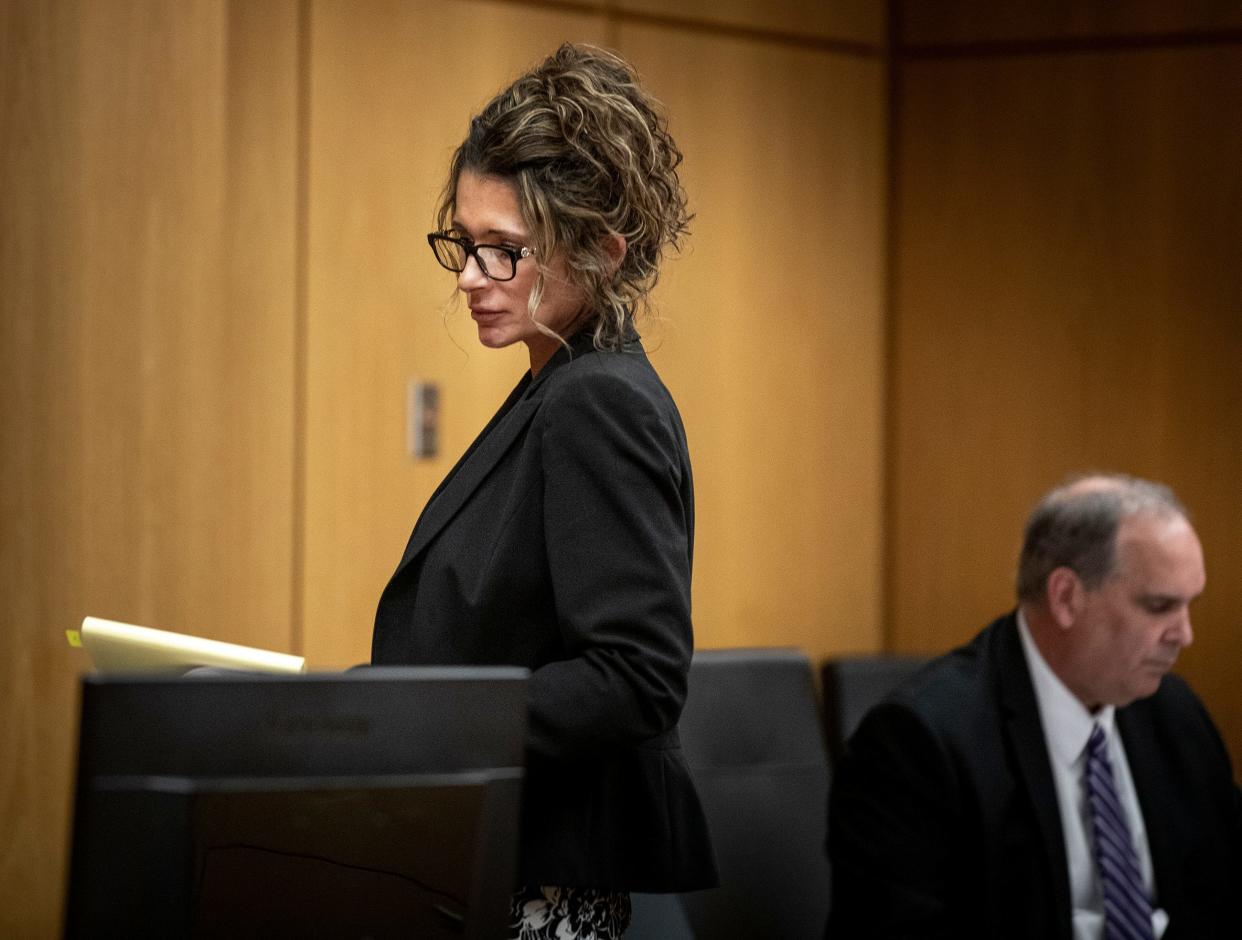
Circuit Judge J. Kevin Abdoney denied a motion Tuesday by defense attorneys representing several death penalty defendants asking the judge to roll back Polk County jail policies on mail and attorneys' personal electronic devices.
The Polk County Sheriff’s Office, which operates the county jails, does not allow attorneys to bring their electronic devices such as phones and laptops into the jails for attorney-client meetings. The jail also uses mail scanners to provide inmates access to their mail, including “legal mail” from defense attorneys about their case.
Abdoney’s ruling will have an impact first on the state’s case against Marcelle Jerrill Waldon, who is accused of killing former Lakeland commissioner Edie Yates Henderson and her husband, David Henderson, on Nov. 10, 2020, in their home on Lake Morton. In addition, Waldon was charged with the burglary of the home of Publix heiress Julie Jenkins Fancelli, which took place two days prior to the Hendersons' deaths.
Jury selection for Waldon's trial is set for next week in the 10th Judicial Circuit Court in Bartow. In all, Waldon is expected to face 10 felony charges related to the crimes, including capital murder charges. The state is seeking the death penalty.
According to the motion filed by defense attorney Debra Tuomey, the Polk County jail policies prevented her defense team from “efficient” and “effective” representation of her clients at the Frostproof jail.
The jail policies restrict communications with clients and violate their constitutional rights, the motion stated.
If the Sheriff’s Office would not change its jail policies, Tuomey had asked the court to order that her clients be transported to a location, such as her legal office or the courthouse, where she could use her own laptop to show them evidence and other media files and documents relevant to their defense.
Tuomey filed the “motion for protective order and motion to compel reasonable access to counsel and digital evidence” on July 12. Other policies restricting communications included the jail’s issuance of Sheriff’s Office laptops for attorneys and limits on visitation hours.
Tuomey said she does not trust the security of placing a thumb drive containing her client's defense files into a Sheriff's Office laptop.
'I've heard no specific incident'
Before denying the motion on Tuesday, Abdoney said there was not enough relevant testimony nor a specific instance in which one of her clients had their constitutional rights violated or attorney-client communications restricted.
Still, Abdoney said other “relevant” testimony – including Sheriff’s Office employees – at the hearing said tablets for reading legal mail were available. He said no other specific instance of violations of her clients’ civil rights nor restrictions on communications between attorneys and clients were stated by any other witnesses called during the hearing except for one inmate.
Tuomey had called inmate Marlon Tyrone Burgess to the witness stand during the first day of the hearing held Oct. 13, and he testified that he was supposed to have access to his mail via a tablet but none was provided.
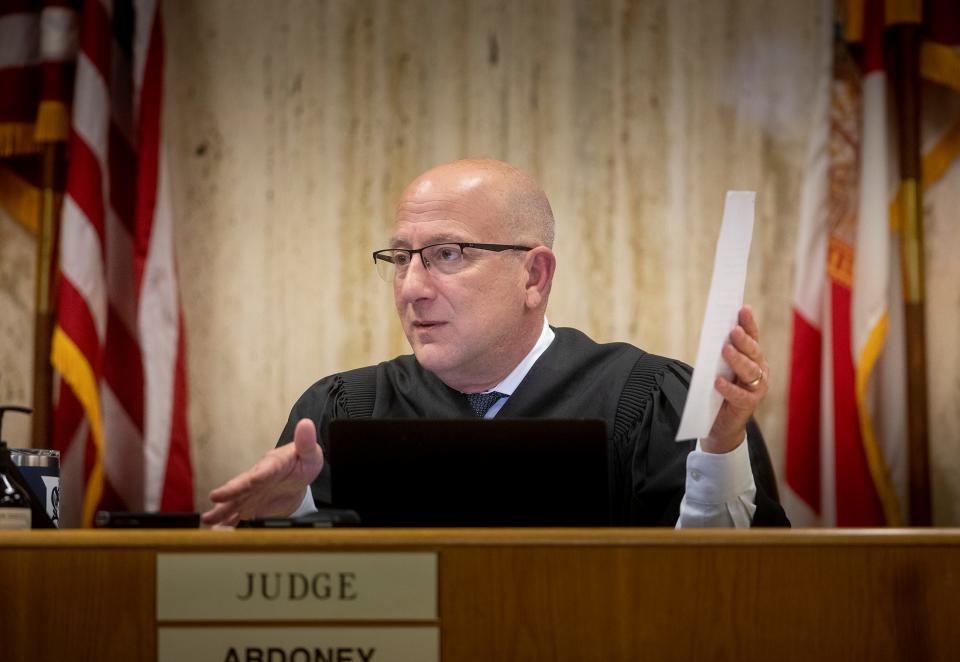
“Other than that testimony, I have heard nothing from any witness, any lawyer, any other inmate, any anyone, that there has been a particular problem with a particular case that would necessitate making some arrangement for a defendant to be transported to an attorney’s office or to require the sheriff to allow a device in the jail,” Abdoney said.
“I’ve heard no specific incident related to legal mail,” he said. “I've heard no specific incident about the laptops at the visitation area of the jail,” he said.
Abdoney also said he thought his criminal court did not have jurisdiction over the jail policy set by the Sheriff’s Office, but he had allowed the hearing to continue as he was treating Tuomey’s motion as he would a request for inmate transportation.
The motion was filed in Florida vs. David Murdock, who was one of eight defendants in court on Oct. 13 whose cases would have been impacted if the motion had been granted. On Tuesday, Waldon was in the courtroom with two other inmates, but Murdock and several other defendants attended remotely.
Other defendants included Joshua Emanuell Badillo, Ernst Cherizard, Ladevon Rashon Cottingham, Jermaine Hawthorn and Antonio Davis. Regis Johnson was also mentioned in the motion, but he is not facing the death penalty for the charges against him.
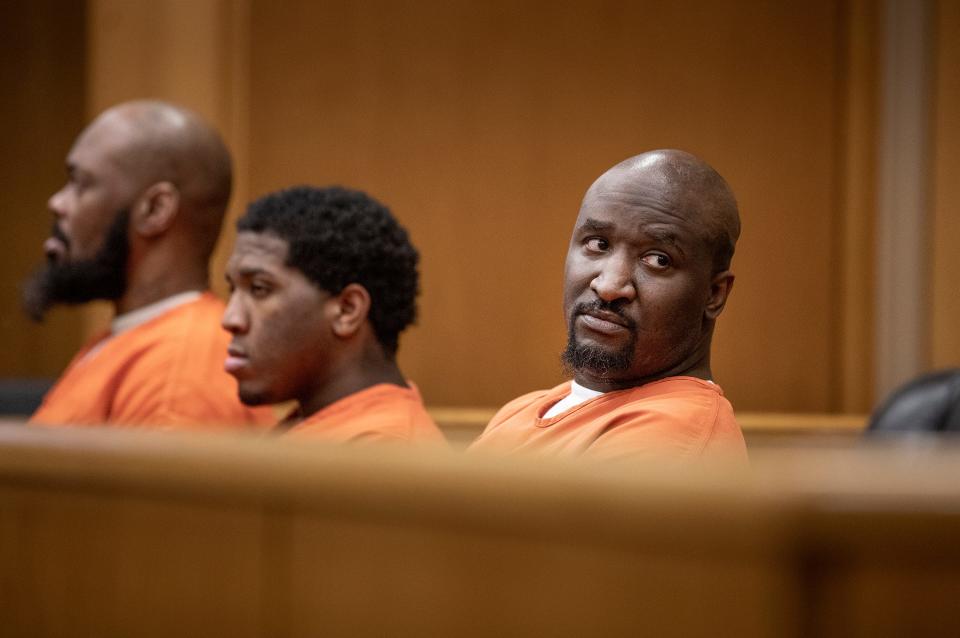
Tuomey had filed similar motions in the state’s cases against Tony “TJ” Wiggins, who is expected to stand trial in July in the slayings of three men in Frostproof in 2020. Wiggins was not in the Polk County court on Tuesday.
Sheriff's Office: It's about security and safety
The jail policy that stopped attorneys from bringing laptops and smart phones to client consultations started after the Sheriff's Office found out images – including cryptic messages – were being taken inside the jail and posted to social media accounts.
A witness for the Sheriff’s Office said it does not want images of the inside of the correctional facility communicated to the outside because the images could disclose the location of cameras and that information could be used by inmates to commit crimes at the jail off camera, among other security concerns.
The Sheriff’s Office started to look at the use of a mail scanner after a 2016 incident in which inmates were sickened through contraband that was unknowingly delivered to the jail by a lawyer on documents laced with chemicals, according to testimony at the hearing.
Mario Cabrera, an attorney representing the Sheriff’s Office, said Polk County was just one of several correctional facilities from California to New Jersey, including Palm Beach County, to institute or consider similar jail policies.
“Society has changed,” he said. We can “no longer say attorneys will not bring in contraband.”
He cited a Houston case in which two inmates died from contact with contraband. The attorney who delivered the drug-laced papers was charged with bringing a prohibited substance to a correctional facility.
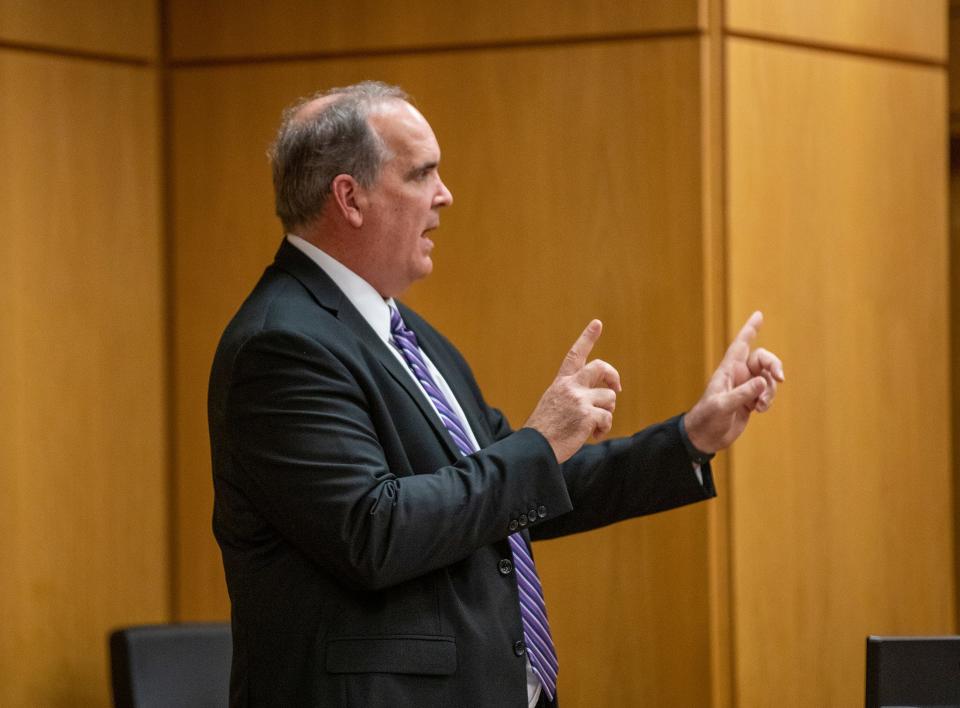
Cabrera frequently raised objections to the questions Tuomey asked the witnesses. Most of his objections were overruled by Abdoney. In one terse exchange, the soft spoken but defiant Tuomey turned to Cabrera and asked whether he could bring his computer to the jail, which prompted another of Cabrera's objections — the only one Abdoney sustained.
Cabrera's objections continued as Tuomey questioned Sheriff's Office information technology supervisor Eric Sowell, whom she had asked to describe the attorney laptop software he called a "sandbox" program. It wipes each attorney-client session clean after the machine is rebooted, he said. The IT department has tested the machines for any lingering files but forensic study of the machines showed they were clean.
"I didn't see any history of these files” in the multiple tests IT conducted, he said. He added that October was the last time the Windows-based machines were updated.
The program is Deep Freeze, he said, and the software has more than 10,000 licenses for users throughout the world, including those held by other law enforcement and government agencies.
Sowell also said each attorney laptop was not Wi-Fi enabled, and the camera and microphones were disabled.
North Lakeland quadruple murder case: Judge rules jury must be unanimous on death penalty
Tuomey raised several other points with Sowell as she questioned him, asking whether the amount of memory the sheriff's laptop had would accommodate the voluminous files needed to show clients in death penalty cases. She also asked about the compatibility for Apple computers and their media player tools, which she uses.
She asked when and if the attorney computers had virus protection, and whether potential viruses could be introduced into the machines.
He responded, the only way a virus could enter the machine is through the attorney’s thumb drive. "It's a possibility."
She also asked whether Sheriff's Office detectives were allowed to bring their laptops into the jail. Sowell said yes, if they were issued by the Sheriff’s Office, but detention policies may differ.
In cross examination of the jail employee who issues the attorney laptops, the court heard there were seven attorney computers to be used at one of 11 attorney visitation booths.
In closing, Cabrera called Tuomey’s statements about the Sheriff’s Office contract for mail scanning potentially slanderous after she said the agency was getting paid for Smart Communications to mine data from inmate mail.
“This is not about selling data,” Cabrera said. He added the health and safety of staff and inmates was the reason for the mail scanning.
Tuomey said the jail may destroy all inmate mail records after seven years, but Smart Communications keeps the data indefinitely. "They are basically mining data to make money down the line," she said, adding the Sheriff's Office gets a cut of that revenue.
Cabrera countered saying the company founder has stated publicly that the goal of starting Smart Communications was to provide safety at correctional facilities.
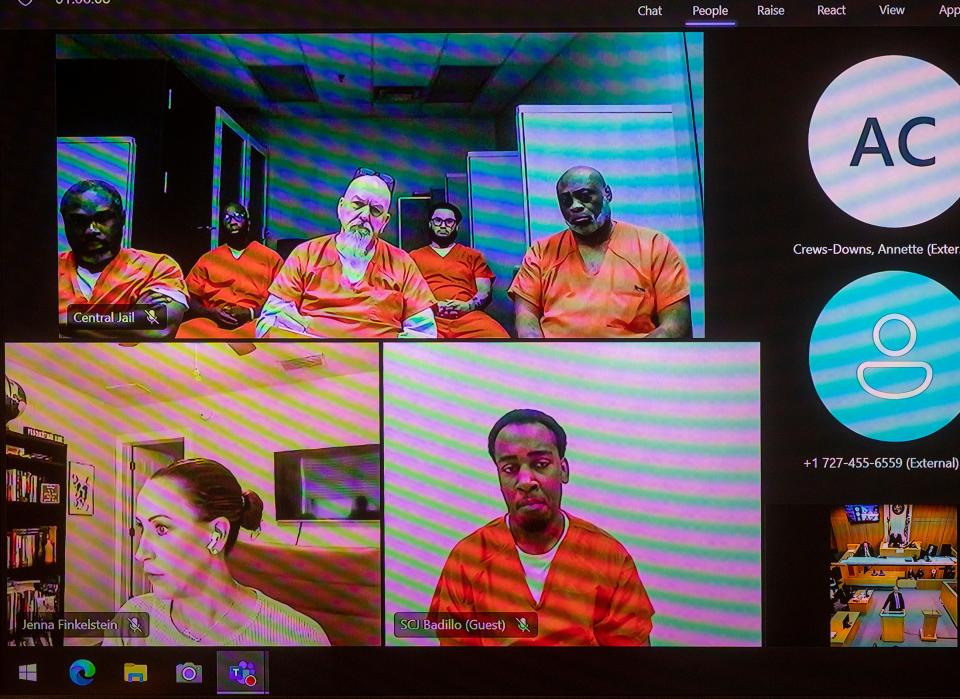
Tuomey said handheld devices were more effective and available for detecting contraband. In a California case, she cited a study that found that only 2% of contraband could be traced back to the jail's mail. She said throwovers and detention staff also were involved in contraband entering the lockup.
Further, the Polk County jail stores the physical mail scanned by inmates so when they leave the facility the hard copies of their mail can be retrieved, and that part of the agency's policy has the potential for storage of drug-laced papers at the jail that will eventually harm the inmate on their release.
She said this contradicts statements that the Sheriff’s Office cares about the safety of inmates.
Tuomey said she would not place her client files into a Sheriff’s Office laptop because such behavior could violate Bar Association rules. Also, her client files often include sensitive medical information protected by federal HIPA laws.
This article originally appeared on The Ledger: Judge denies defense attorney's request to use her laptop in Polk jail

